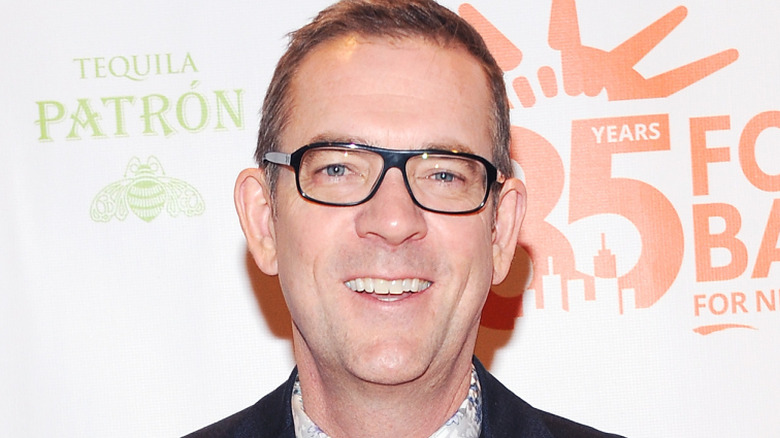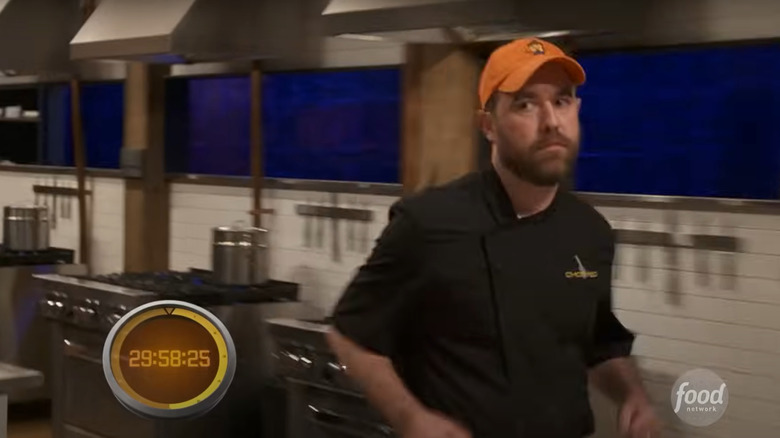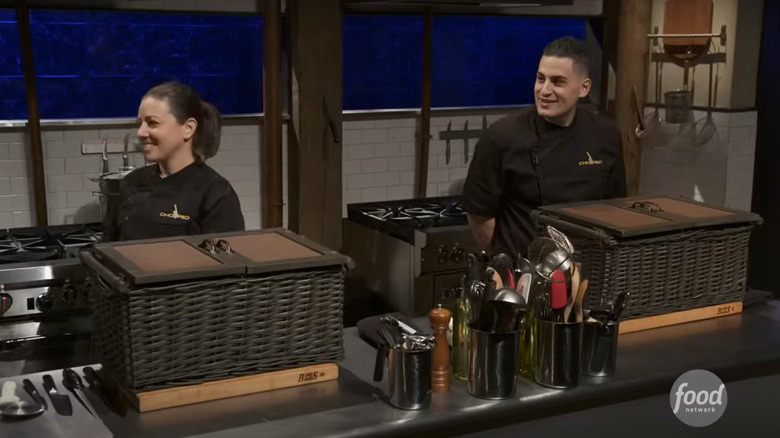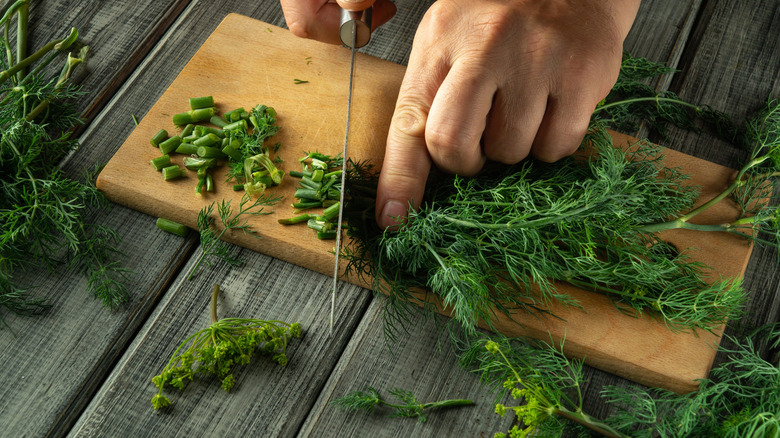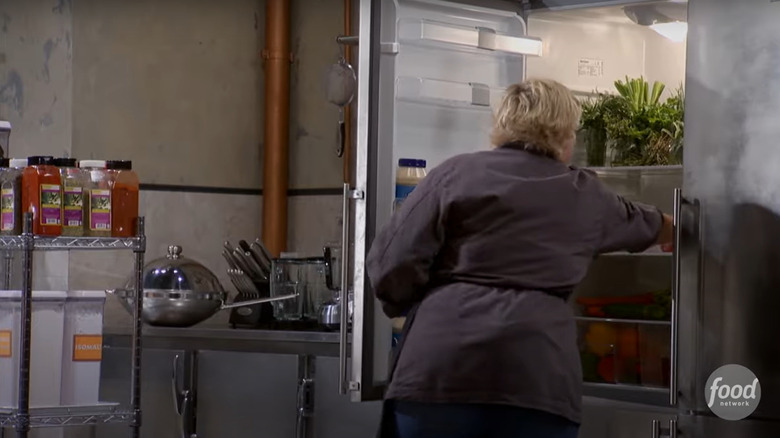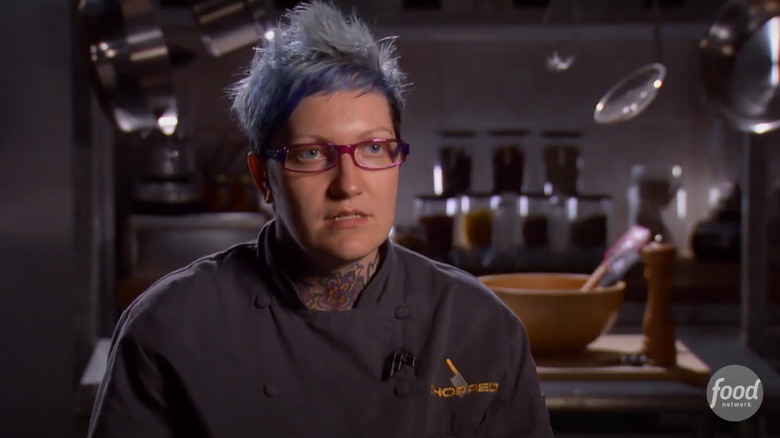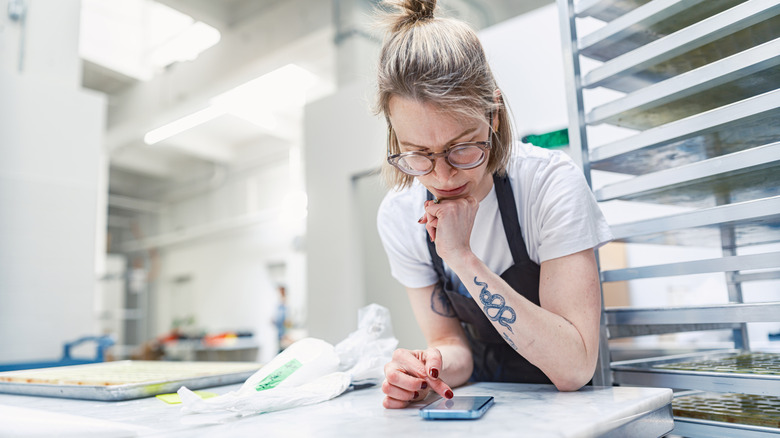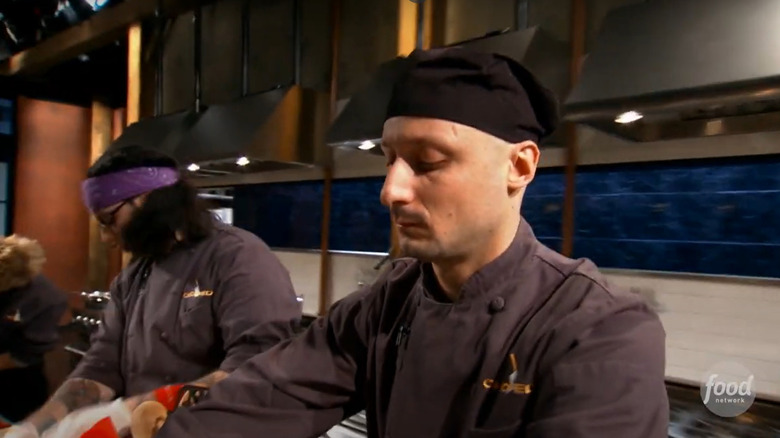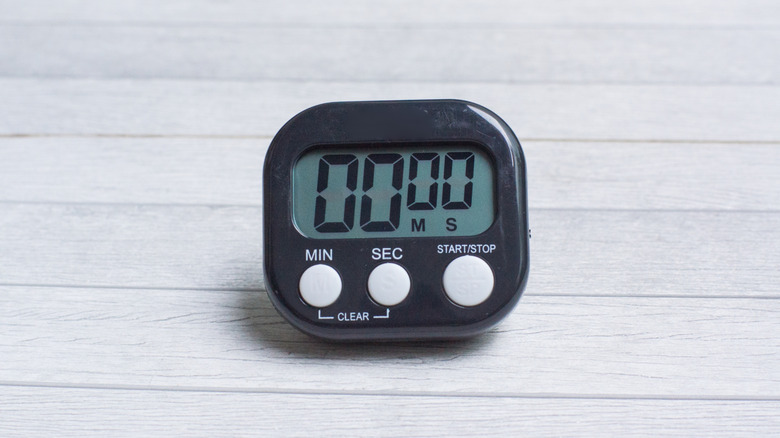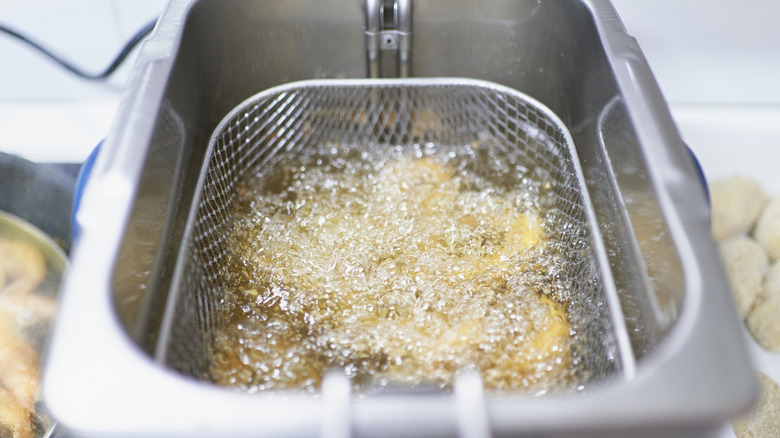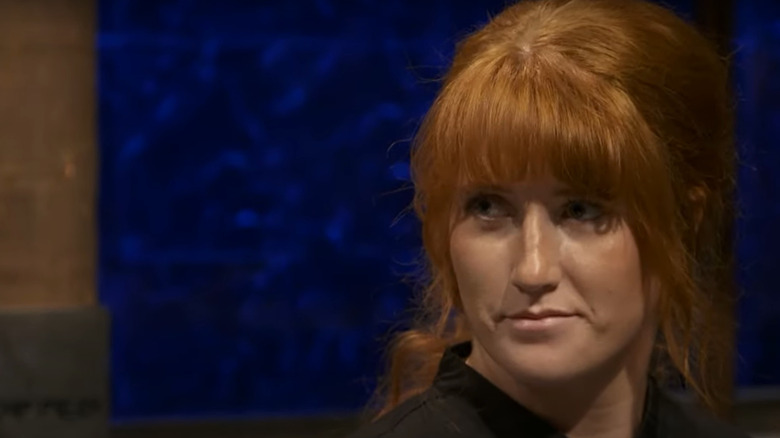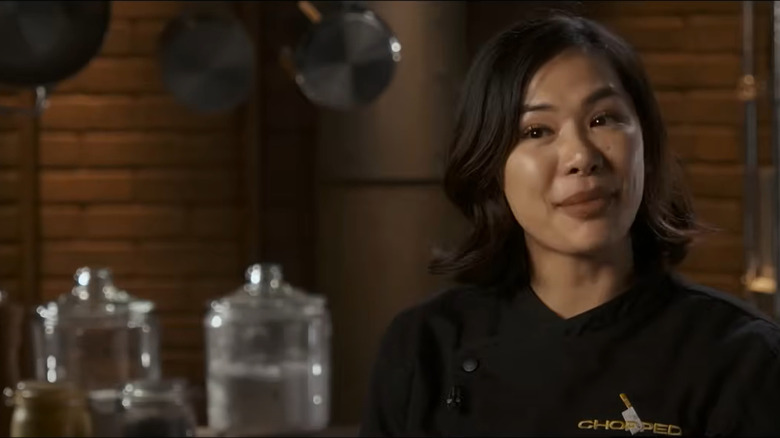Strict Rules Chopped Contestants Have To Follow
If you've ever watched "Chopped," you know it's not just about cooking. Contestants also need to be good at handling pressure and improvising with mystery ingredients, all the while impressing some of the toughest judges in the business. What you don't always see on camera, though, is how many strict rules shape the experience. From the moment a chef gets the call to appear on the show to the second they step into that gleaming kitchen, there are layers of protocol to follow.
To find out what really happens when the cameras aren't rolling, I spoke with two chefs who've competed on the show: Clara Park, who appeared in season 20 of "Chopped," and Shane Chartrand, who was a contestant on "Chopped Canada." Both gave insight into the rules and routines that guide contestants through the process, some of which are invisible to the audience but hugely impactful for the chefs.
Some rules are about protecting the suspense and integrity of the competition, while others are more practical, ensuring fairness in the kitchen or simply keeping the production on schedule. Together, they paint a picture of just how much structure goes into a show that, at first glance, looks like pure chaos. So, before you start dreaming about taking home that $10,000 prize or what applying for the show is like, it's worth knowing what restrictions come with stepping onto the set.
Chopped contestants have to wait to announce they're appearing on the show
Landing a spot on "Chopped" is no small accomplishment — but contestants can't just shout it from the rooftops as soon as they get the news. In fact, according to Chef Shane Chartrand, owner of Paperbirch by Chartrand in Edmonton, they're told to keep the whole thing under wraps until the production gives them the green light. That means no excited Instagram posts, no teasing TikToks, and in many cases, not even a casual mention to coworkers or acquaintances.
Like many competitive reality shows, Chopped relies on secrecy to keep the drama and anticipation intact. If word leaked early about who was competing or how far someone made it, the suspense would vanish before the episode even aired. To avoid spoilers, contestants are usually given strict guidelines about who they can tell and when. Immediate family or a partner might be in the loop for practical reasons, but otherwise, silence is expected.
The wait to make an announcement can last months, since episodes are often filmed well in advance of their air date. For chefs eager to share the news with friends or use the appearance to promote their business, this delay can be especially tough. Still, it's part of the trade-off for being on national television. Once contestants do get permission to announce, though, they're encouraged to lean into the buzz, which can mean a flood of social media posts and other promo.
Contestants can't choose their station
"Chopped" is filmed in New York, where that iconic kitchen is set up in the Food Network studios. When contestants finally step on set, one of the first surprises is that they don't get to choose where they'll cook. Instead, stations are assigned randomly — and that detail matters more than you might think. Each of the four stations has its own quirks, and not all of them are equally desirable.
An article written by "Chopped" contestant Brooke Siem for Business Insider revealed that certain stations have advantages. Station one is the one furthest to the right of your screen when you're watching the show. It's closest to the pantry, which can end up saving a lot of time. Station four, however, is the furthest to the left of your screen and closest to the judges. Folks assigned to this station may be able to overhear hints from the judges about how to handle the mystery box items. This seems like a big perk, but the set is larger than you might think, so they'll have to plan ahead to avoid too many trips to the pantry or wind up losing time.
The random assignment is meant to keep things fair, but the station a contestant ends up at can make a difference. There's no switching and no asking for a particular station. Cooks on the show have to follow their assignment and make the best of it, even if it wouldn't have been their first choice.
Contestants must use every mystery basket item
The mystery basket propels every round on "Chopped." It's a collection of curveball ingredients that forces chefs to invent on the fly. Among the most bizarre ingredients included in the "Chopped" mystery basket are a to-scale human skull made from gummy candy and an actual goat head — how do you even incorporate those into a dish?
Chefs can't simply bypass an awkward ingredient. "You are required to use every mystery basket item, full stop," contestant Clara Park, who runs cooking school Eat Cetera Philly and hosts a podcast called The Cinema Chefs. Shane Chartrand backed this up, adding, "Even though the ingredients were not the greatest and very strange, you could not skip using any of them."
Everything in the basket should have a role, even if it's used as a small element in the dish. Sometimes a contestant turns an unwieldy item into the twist that elevates a plate; other times it becomes the weakness that knocks them out. If a chef fails to use one or more mandatory items, it's highly unlikely they'll reach the next round unless a rival makes a spectacular error.
But chefs can be flexible in the way they use these ingredients. A mystery item can be transformed into a puree, a garnish, a sauce or an infused oil rather than the main feature. Savvy contestants plan quickly, finding ways to make the basket items feel intentional rather than tacked-on. "I made sure to think about how I was going to use everything from the beginning," Park told us.
No prep is allowed before the clock starts
One of the fundamental rules on "Chopped" is that contestants cannot prep ingredients before the round. No pre-chopping, no pre-cooking, no sauces simmering off-camera. "There is zero prep before the clock starts," Clara Park told us. The point is fairness. The show tests how chefs perform under the same strict time constraint, so prior work would compromise the competition.
There are small, practical exceptions that help the contestants get started, which aren't exactly "prep," but still allow the cooks to get off to a quick start. According to Park, "There is a stockpot of boiling water and a pre-heated oven on every contestant's station ready to go when the competition starts." Apart from that, everything must be done while the clock is running.
This adds to the drama of the show. If contestants were allowed to prep ahead of time, you wouldn't get the same flurry of activity. It also makes sure that nobody has an advantage. Any ingredients that were prepped at home, for instance, contestants could have had help with. While it means that they have a lot to do in the time given, we appreciate those time constraints and what they add to the show.
Contestants on Chopped have to share the communal fridge and pantry
"Chopped" contestants work from a shared fridge and pantry, season 20 contestant Clara Park explained to us. The production provides the communal shelves with staples and fresh produce, but they're for everyone. That setup can add friction to an already pressured environment.
"We all have equal access to all the same ingredients," said Park. While this is great in theory, Park noted that it can lead to popular items being hard to find. However, Park told us that asking fellow contestants for ingredients is normal. It's not like someone can take the cumin and hoard it, refusing to share, but if other contestants are reluctant to ask, they might miss out or waste precious time searching.
The communal pantry also forces fast decisions about substitutions. If an ingredient a contestant wants is used up, they have to pivot, choosing something else instead. Broad ingredient knowledge pays here. Those who know what to sub and have a great command of flavor combinations will do better here. In short, the fridge and pantry test logistics, communication, and composure as much as culinary skill.
Contestants have to adhere to the dress code
Safety and presentation matter on Chopped, and production enforces a clear dress code that contestants must adhere to. Folks appearing on the show are given the show's signature chef jacket, which varies across seasons, to wear on camera. It creates a uniform look and also aligns with on-set safety standards. However, they're allowed to bring their own pants and footwear.
Sizing can be a real issue, though. Contestants tell production what size jacket they need, but they don't always get an exact match. As Clara Park told us out, "I ordered a women's small but got a much bigger chef coat because they tend to only have unisex or men's sizing, which can actually be quite dangerous as loose clothing and ill fitting jackets are known to get stuck on knobs, hooks, and corners." Ill-fitting clothing isn't just awkward on camera, it's a hazard when you're reaching for pans, leaning over burners, or moving quickly between stations.
For chefs used to their own comfortable uniforms in their restaurants, the on-set kit can feel different. Luckily, it's only the chef's jacket that they can't bring from home, so they should be relatively comfortable. Still, issues with sizing can present an extra problem on set.
Chopped contestants aren't allowed to look at their phones on set
For many people, reaching for a phone in a moment of downtime is a reflex. But, according to Clara Park, contestants aren't allowed to use their phones at any point during filming. From the moment contestants arrive, production controls access to mobile devices. This is for several reasons: to prevent spoilers, avoid distractions, and keep people from looking up recipes or asking for advice.
Without a constant stream of texts, calls, and notifications, chefs can concentrate fully on reading baskets, timing techniques, and managing the inevitable pressure. It also reduces the chance that plot points — who advanced, who was eliminated, or what mystery basket ingredients chefs have to work with — leak before air date.
For contestants used to being reachable or scrolling Instagram in any moment of downtime, the blackout can feel strange. But, we understand why this rule is in place. It could give some contestants an unfair advantage, even if used between rounds. And it could throw the production schedule off if folks were too busy looking at their phones to engage. Honestly, a full day away from phones and tablets doesn't seem like a bad thing.
Contestants can't leave the set
What "Chopped" won't show you on air is that each episode can take around 14 hours to film. But, during this time, contestants aren't allowed to leave the set. Clara Park revealed to us that they were "not allowed to leave the set under any circumstance." Once filming begins, contestants are in the land of "Chopped," and that means they can't wander off the set.
This sequestering keeps the production on schedule and ensures fairness. If a contestant could slip away between rounds to consult a teammate, check social media, or grab extra supplies, the playing field would tilt. Instead, movement is controlled and monitored by production staff. This level of oversight also helps preserve continuity for filming: lighting, sound and camera setups are timed tightly, and having chefs come and go would complicate the shoot and risk delays.
There's an emotional angle, too. Being unable to leave can heighten the pressure. Contestants feel the weight of the competition in a literal way, isolated from outside support or distraction. That confinement can sharpen focus, but it can also make people more nervous. In the end, the rule is simple: When you sign up to compete on national television, you accept that the set becomes your strict, high-stakes temporary workplace.
Once time is up, it's up
On "Chopped," the clock counts down to a hard rule: When the timer hits zero, plates must be finished and hands go up. There's no sympathetic extension for a last-minute flourish, which is why finishing before the buzzer matters as much as the cooking. As Clara Park put it, "If you don't finish plating before the time is up, it reflects poorly on you as you've basically failed the assignment, most likely you won't make it to the next round unless everyone else messed up too." She added, "Nobody cares how good your food is if you can't get it on the plate."
The finality is literal. Contestants are not allowed to continue cooking after the end of the round. "When your hands were up, they were up," Shane Chartrand told us. "No more cooking whatsoever." That reality changes how chefs plan: many will pare back components or choose quick methods to ensure time for attractive plating rather than gamble on a dramatic finish that never gets seen.
Finishing on time shows that contestants are organized and respect the brief. Judges often penalize failure to plate as a management error as much as a culinary one. On the show, when your round is done, you're done, so cooks need to plan carefully to avoid getting chopped.
Contestants must share certain items of equipment
There might be some awkward moments on "Chopped," but contestants have to get over them and learn how to share. Not every piece of kit is multiplied across the four stations, so contestants need to be strategic. When a critical appliance is limited, chefs must plan both what and when to cook.
"There is only one fryer and one ice cream machine," Clara Park told us. This means, "you need to be smart about what you're doing to use and when, it's a waste of time to wait to use a piece of equipment," she said. Those shared machines force real-time coordination. If a chef needs the fryer for a crisp finish, they either stake a claim quickly or pivot to an alternate technique.
Some specialized kit may be communal while more general tools sit at each station, so contestants must be fluent in sequencing. They need to work out which component to cook first, when to use those shared items, and when to change direction and finish the dish in another way rather than wasting time queuing. Given the limited time chefs on the show have, sharing equipment can be a challenge — but that's part of the fun of the show.
Chopped contestants have to arrive on set camera-ready
Unlike the hosts and judges, contestants aren't typically treated to professional hair and make-up on set, so they have to arrive looking ready for television. "You need to come camera ready to the set," Clara Park told us. "I was surprised that they don't offer to do hair and make-up," she added.
The contestants arriving ready keeps the production on schedule — if they needed full hair and make-up services, they'd have to arrive on set earlier and costs would rise. For chefs used to a familiar back-of-house uniform, coming ready to film can seem a bit daunting. They might be hoping for a bit of TV glamor, but the food is the important part, not how the contestants look.
They might have to make themselves look presentable for the show, but at least "Chopped" contestants don't have to wash their own dishes. Thank goodness for small mercies. After a long day of filming, they're free to head back to their homes or hotel rooms.
Contestants have to wait until they're chopped from the show to record their interview
The reflective talking head interviews you see on "Chopped" — where chefs explain choices, relive mistakes and narrate the drama — are never filmed mid-competition. Contestants must wait until after they're chopped to record their interviews. The production team films all exit interviews only after a contestant's run is finished, whether that means after the appetizer round or after winning the whole episode. The further a chef goes, the longer and more detailed the interview tends to be, since winners need to walk back through every challenge.
This is a practical choice. It keeps the day going on schedule. Contestants who are still in the running don't have to interrupt their flow to film interviews between rounds and those who have been asked to leave can film their interviews in another part of the studio while the others carry on cooking.
But, it can be tricky for the cooks. They have to talk about the action like they don't know what's going to happen. The winner of the episode has to pretend they aren't about to take $10,000 home while they reflect on what happened in each round. And those that go out early have to attempt not to sound too disappointed. They're chefs, not actors, so it's not the most natural thing in the world, but the producers try to direct questions carefully to get what they need.
